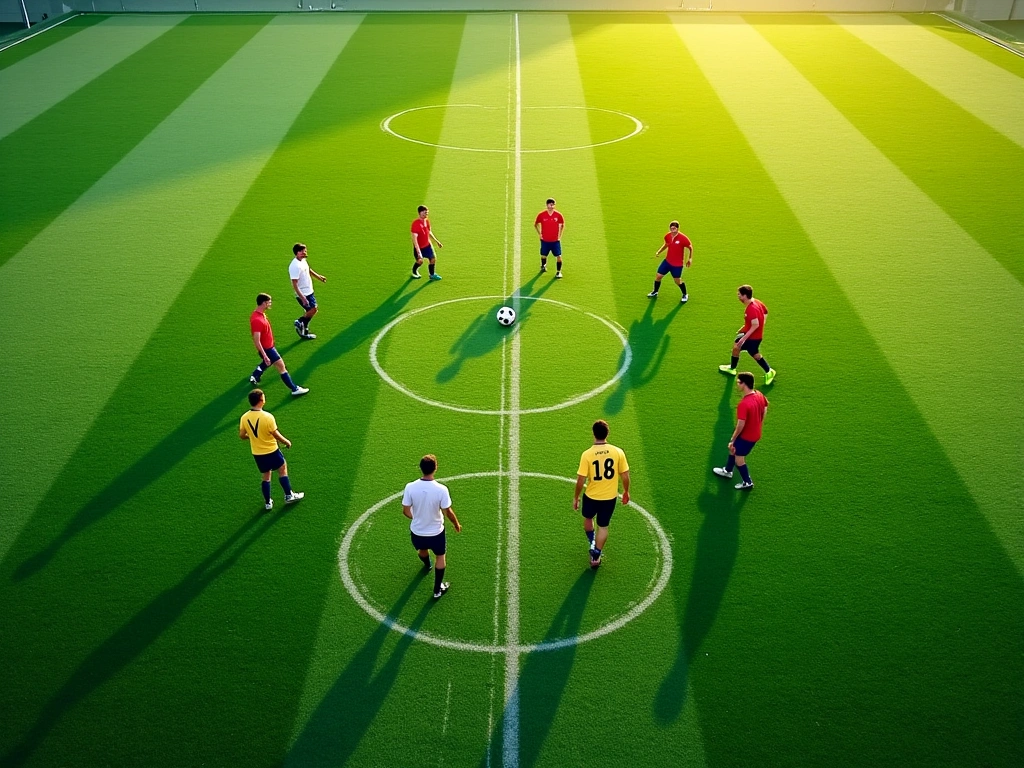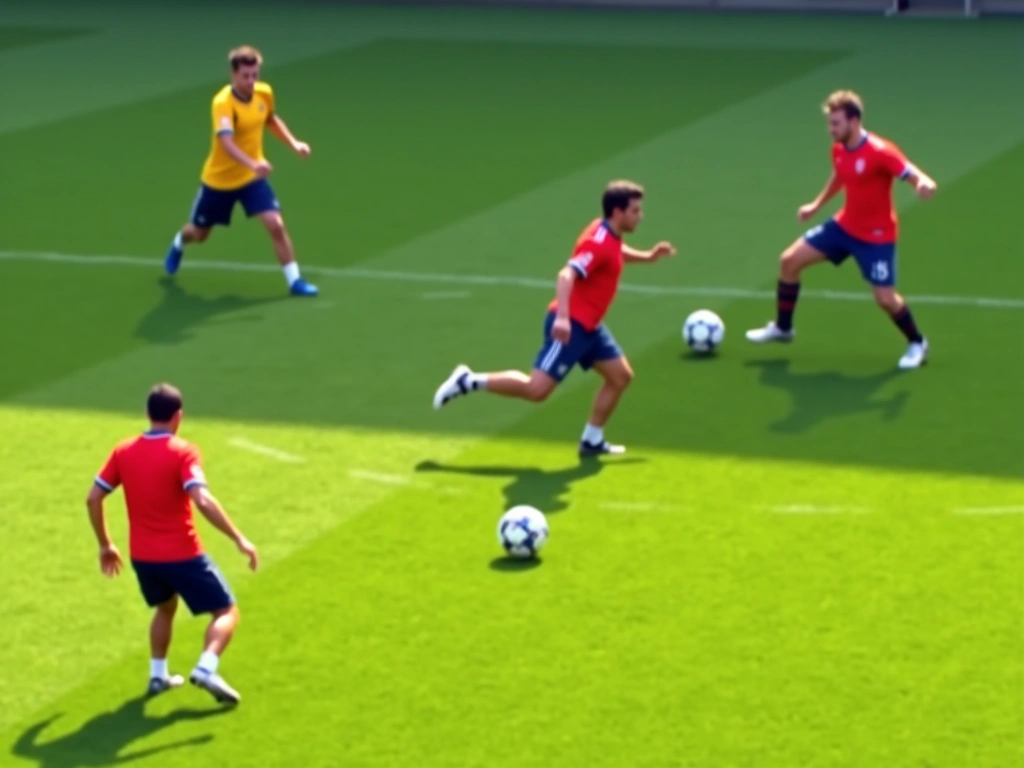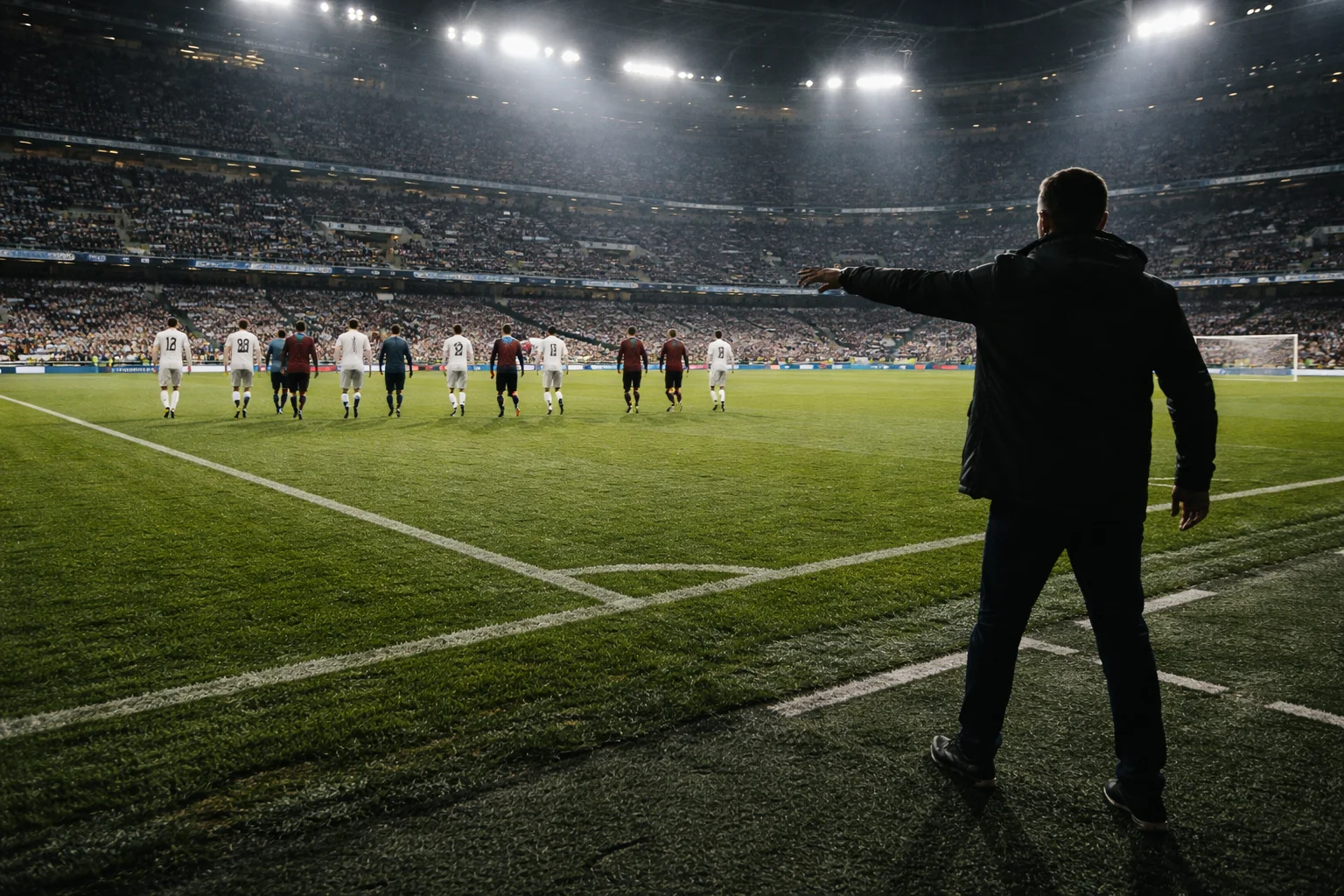Soccer is fundamentally a game of spatial relationships and collective intelligence. While individual brilliance can decide moments, sustained success relies on the cohesive movement of all eleven players acting as a single unit. True teamwork extends beyond simple encouragement; it requires a shared understanding of tactical triggers, movement patterns, and non-verbal communication.
Developing this level of synchronization requires training sessions that mimic the chaotic, fluid nature of a real match. Drills must force players to solve problems together rather than in isolation. When a midfielder drops deep to receive the ball, the fullbacks must instinctively know when to push high, and the wingers must understand when to invert.
This guide explores specific, high-level drills designed to forge these connections. By focusing on possession structures, defensive shifting, and transition play, coaches can transform a group of talented individuals into a disciplined, synchronized team. The focus here is on the mechanics of cooperation and the tactical geometry required to control the pitch.
The Rondo: Establishing Possession and Angles
The Rondo is often mistaken for a simple warm-up exercise, but it is actually the foundation of positional play. In its most effective form, the Rondo teaches players to constantly adjust their positioning relative to the ball and the defender. The goal is not merely to keep the ball away from the defenders but to split them with penetrating passes.
A standard 4v2 or 5v2 Rondo within a tight grid forces attackers to play with their heads up. The players on the perimeter must maintain an open body shape, allowing them to see both the incoming ball and their next passing option simultaneously. This drill instills the concept of the “third-man run,” where players support the ball carrier by offering diagonal passing lanes rather than standing flat-footed.
Defensively, the players inside the Rondo learn to press in pairs. They must communicate constantly to cut off passing lanes and force the attackers into mistakes. This micro-environment replicates the intensity of midfield battles, teaching players that defensive teamwork is about coordinated pressure rather than individual chasing.
Dynamic Passing Patterns and Third-Man Combinations
Static passing lines often fail to translate to match performance because they lack the element of timing and defensive pressure. Dynamic passing patterns, such as the “Y-Drill” or “Up-Back-Through” combinations, teach players to manipulate the opponent’s shape. These drills require three or more players to move in synchronization to exploit space behind a defensive line.

In an “Up-Back-Through” sequence, the first player passes forward to a target player (Up), who immediately lays the ball back to a supporting midfielder (Back). Simultaneously, a third player makes a sprinting run into space to receive a through ball (Through). This pattern breaks defensive lines by drawing opponents toward the ball before exploiting the space they leave behind.
The success of this drill hinges on the timing of the movement. If the third man runs too early, they are offside or covered; if they run too late, the passing window closes. Repeating these patterns helps players develop a subconscious understanding of their teammates’ tendencies, allowing them to execute complex plays at high speed during a match.
Defensive Shifting and Zonal Compactness
A cohesive defense moves like a chain; if one link breaks, the entire structure fails. Defensive shifting drills focus on the team’s ability to move laterally and vertically as a compact unit. The objective is to deny the opponent space between the lines and force play into wide, less dangerous areas.
A common drill involves a back four connected by a rope or holding a shared pole to physically enforce distance constraints. While this is a training aid, the advanced version involves “shadow play” against a full attacking squad. As the ball travels from the opponent’s left back to their right winger, the defensive unit must slide across the pitch together, maintaining specific distances between defenders.
Communication is paramount in these scenarios. Center-backs must act as vocal leaders, commanding the line to “step up” or “drop off” based on the pressure on the ball. If the ball carrier is unpressured, the defense must drop to prevent a ball over the top. If the ball carrier is under pressure, the defense steps up to compress the space. Mastering these triggers prevents gaps from opening up in the defensive third.
Transition Play: The Five-Second Rule
Modern soccer is often decided during the transition phases—the moments immediately after the ball is won or lost. Teams that react fastest to these turnovers control the rhythm of the game. Drills focusing on the “five-second rule” train players to immediately counter-press upon losing possession, attempting to win the ball back instantly while the opponent is disorganized.
A setup for this involves a small-sided game where a team is awarded double points for scoring within five seconds of winning the ball. This incentive forces the defending team to anticipate interceptions and immediately sprint forward. Conversely, the team that lost the ball must instantly swarm the possessor to prevent the counter-attack.

This type of training conditions the mental aspect of teamwork. It eliminates the habit of frustration or pausing after a mistake. Instead, players learn that the immediate collective reaction to a turnover is more valuable than the error itself. It builds a mentality where the nearest player presses while others cover passing lanes, turning defense into attack in the blink of an eye.
Small-Sided Games with Neutral Players
Small-sided games (SSGs) are vital for replicating match intensity, but adding “neutral” players (often called jokers or magic men) elevates the tactical complexity. In a 4v4+3 setup, three neutral players play for whichever team has possession. This creates a permanent numerical overload for the attacking team, usually 7v4.
The presence of neutrals forces the attacking team to utilize their numerical advantage to keep possession. They must learn to circulate the ball patiently, waiting for the right moment to penetrate. The neutrals, often positioned centrally or on the wings, act as pivots, teaching the core team how to utilize width and depth effectively.
For the defending team, this drill is physically and mentally demanding. They are constantly outnumbered and must work tirelessly to close down space. This reinforces the need for disciplined defensive shape and intelligent pressing. When they finally win the ball, they must quickly transition to utilizing the neutrals, shifting the dynamic instantly.
Non-Verbal Communication and Scanning
At the highest levels, stadiums are loud and the game is fast, rendering verbal communication difficult. Teams must rely on non-verbal cues and high-frequency scanning. Scanning refers to a player checking their shoulder and surroundings before receiving the ball. Drills that emphasize scanning improve the speed of play and collective awareness.
One effective method involves using colored cones or bibs that change during the drill. Players might be required to call out a color held up by a coach while receiving a pass. This forces them to look away from the ball and assess the field. In a team context, this translates to knowing where teammates are without staring at them.
Developing this “head on a swivel” habit ensures that players already know their next move before the ball arrives. It allows for one-touch passing and fluid movement, as players are reacting to the space and the positioning of their teammates rather than just the movement of the ball. This shared visual awareness is the hallmark of a mature, synchronized team.
FAQ
How often should teamwork drills be incorporated into training?
Teamwork drills should be a component of every training session. While individual technical work is important, soccer is inherently a team sport. Most coaches dedicate at least 40% to 60% of a session to opposition-based drills or small-sided games that require collective problem-solving. Consistency is key to developing subconscious understanding between players.
Can these drills be adapted for younger age groups?
Yes, but the complexity must be scaled down. For players under 10, focus on simple 2v1 or 3v1 situations to teach the basic concept of passing to an open teammate. Avoid complex tactical shifting or zone defense until players have mastered basic spatial awareness. The core concept of working together remains the same, but the cognitive load should be manageable.
What if a team has an odd number of players at practice?
Odd numbers are actually beneficial for teamwork drills. Use the extra player as a “neutral” or “all-time offense” player who plays for whichever team has the ball. This creates a numerical advantage (overload) for the attacking team, making it easier to keep possession and encouraging passing combinations. It also forces the defenders to work harder, improving their fitness and coordination.
How do coaches measure improvement in teamwork?
Improvement is best measured by the speed of play and the reduction of unforced errors during scrimmages. A cohesive team will move the ball faster with fewer touches because options are created before the ball arrives. Defensively, improvement is seen in the compactness of the shape and how quickly the team recovers the ball after losing it.
Do goalkeepers participate in these teamwork drills?
Absolutely. Modern goalkeepers are the first attackers and the last defenders. In possession drills like Rondos or SSGs, goalkeepers should act as support players, helping to switch the point of attack. Defensively, they must communicate with the back line, organizing the shape and acting as a sweeper-keeper to cover space behind the defense.
What equipment is needed to run these drills effectively?
Most teamwork drills require minimal equipment: a supply of balls, distinct colored bibs (pinnies) to differentiate teams clearly, and cones to mark grid boundaries. Using different colored cones can also help create visual cues for scanning drills. The most important tool is a clearly defined space, as boundaries force players to make decisions within a confined area.
How can a team improve communication if players are naturally quiet?
Coaches can implement “silent” scrimmages where players are not allowed to talk, forcing them to rely on eye contact and hand gestures. Conversely, specific drills can be designated as “loud” drills where a pass only counts if the receiver calls for it by name. Assigning specific communication roles, such as designating a center-back as the defensive organizer, also helps quiet players develop leadership skills.


